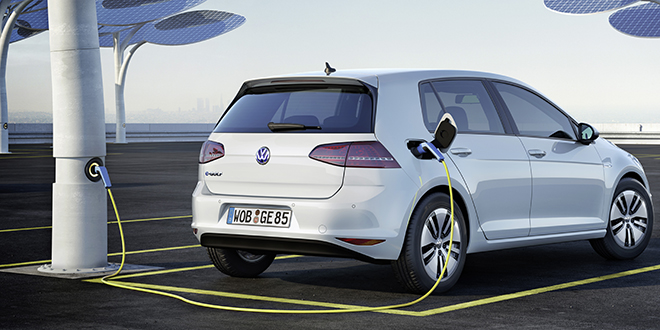Volkswagen has refuted a recent anti-EV hit piece with a new study that confirms what many earlier studies have found: EVs have smaller life-cycle carbon footprints than comparable ICE vehicles, even if they are charged by dirty fossil-derived energy.
“For the same vehicle models with different powertrains, the carbon footprint of the battery-powered E variants is already better than those of the corresponding vehicles with internal combustion engines. In addition, the electric vehicles offer a higher CO2-saving potential in all phases of the product cycle,” write the study’s authors.
The VW study compared two different versions of the same vehicle: a diesel-powered Golf TDI and an all-electric e-Golf (unlike the debunked article from the Institute for Economic Research, which compared two very different vehicles). “In summary, the current Golf TDI (Diesel) emits 140g CO2/km on average over its entire life cycle, while the e-Golf reaches 119g CO2/km,” says VW.
The VW researchers divided a vehicle’s life cycle into three phases: production, use and recycling. They found that most of the emissions from an ICE vehicle occur during the use phase, that is, in the supply chain of the fossil fuel and the combustion. “Here the Diesel reaches 111 g CO2/km. A corresponding vehicle with electric drive emits only 62 g CO2/km during this phase, which results from energy generation and supply.”
The study did find, as others have, that the production of an EV can generate more emissions than that of an ICE vehicle. “Most emissions from the battery-powered electric vehicle are generated in the productions phase. According to [life cycle analysis], a Diesel here generates 29 g CO2/km, while 57 g CO2/km were determined for a comparable e-vehicle. The battery production and the complex extraction of raw materials are responsible for this. These emissions account for almost half of the CO2 emissions of the entire life cycle.”
Debunking the anti-EV crowd was not the sole purpose of this study – VW plans to use the conclusions to reduce the life-cycle emissions of its vehicles even further. “Improvements in lithium-ion battery technology and supply chain optimizations lower the carbon footprint during battery manufacturing for the first ID. model planned for 2020 by more than 25 percent per kilowatt hour (kWh) of battery capacity compared with the e-Golf.”
As other studies have found (and common sense tells us), emissions are lower when a vehicle is charged by renewable sources. “By far the greatest potential for reducing CO2 emissions arises from the source of energy applied during the use phase. If electricity for driving during the use phase is obtained exclusively from renewable sources, CO2 emissions of 62 g CO2/km in today’s EU electricity mix will drop to just 2 g CO2/km.”
VW subsidiary Group Elli (Electric Life) now offers customers in Germany the option of charging their vehicles with “Volkswagen Naturstrom,” which comes exclusively from renewable energy sources. (The discredited IFO study assumed that all EV drivers would use the typical mix of energy delivered to the German grid.)
“Recycling the vehicle offers further opportunities to reduce CO2 emissions,” says VW. The company is building a pilot battery recycling plant at its facility in Salzgitter, where “black powder” from end-of-life batteries will be recycled into cathodes for new batteries. “This results in a potential CO2 reduction of up to 25 percent.” (The specious IFO piece ignored the possibility of recycling, incorrectly assuming that batteries would become “hazardous waste” after 150,000 km – shorter than the typical warranty period for an EV battery.)
It appears that the truth has finally got its shoes on, but unfortunately the lie has already spread around the world. Hundreds of media outlets, including the once-respected Wall Street Journal, cited the misleading IFO article, and ignored the multiple articles debunking its conclusions. In contrast, the new VW study has so far attracted almost no press attention – a summary in Teslarati is the only reference to it that we’ve seen as yet.
However, the fact that VW is taking a stand on this issue is highly encouraging. The greatest danger posed by the IFO’s hit piece is that automakers will use it as ammunition to lobby policymakers to abandon support for EVs. Volkswagen is the largest and most influential of the German brands, and the most interested in electrification. In the internal politics of every automaker, there are pro- and anti-EV factions. The pro-EV voices at VW can now add the company’s own study to the long list of existing studies that have refuted the myth of the Long Tailpipe.
Sources: Volkswagen, Teslarati





















































